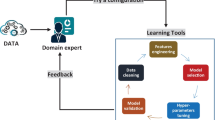
Overview
- Provides engineering-lean, unsupervised methods that scale in realistic scenarios
- Helps to improve reliability and efficiency of complex systems
- Presents examples and results from real factories and real cyber-physical systems
Part of the book series: Technologien für die intelligente Automation (TIA, volume 8)
Buy print copy
Tax calculation will be finalised at checkout
About this book
Similar content being viewed by others
Keywords
Table of contents (7 chapters)
-
Front Matter
Editors and Affiliations
About the editors
Dr. Peter Schüller is postdoctoral researcher at Technische Universität Wien. His research interests are hybrid reasoning systems that combine Knowledge Representation and Machine Learning and applications in the fields of Cyber-Physical systems and Natural Language Processing.
Bibliographic Information
Book Title: IMPROVE - Innovative Modelling Approaches for Production Systems to Raise Validatable Efficiency
Book Subtitle: Intelligent Methods for the Factory of the Future
Editors: Oliver Niggemann, Peter Schüller
Series Title: Technologien für die intelligente Automation
DOI: https://doi.org/10.1007/978-3-662-57805-6
Publisher: Springer Vieweg Berlin, Heidelberg
eBook Packages: Engineering, Engineering (R0)
Copyright Information: The Editor(s) (if applicable) and The Author(s) 2018
Softcover ISBN: 978-3-662-57804-9Published: 31 August 2018
eBook ISBN: 978-3-662-57805-6Published: 20 August 2018
Series ISSN: 2522-8579
Series E-ISSN: 2522-8587
Edition Number: 1
Number of Pages: VII, 129
Number of Illustrations: 23 b/w illustrations, 29 illustrations in colour
Topics: Quality Control, Reliability, Safety and Risk, Robotics and Automation, Input/Output and Data Communications



